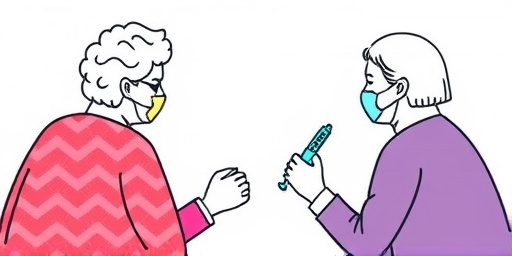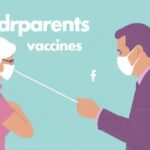In a strategic push to rebuild trust in Vaccines amid persistent public health challenges, the Southern Seven Health Department has officially launched the ‘Grandparents for Vaccines‘ initiative. This community-driven campaign harnesses the influence of trusted elders to counter rampant misinformation and address vaccine hesitancy in southern Illinois. Announced on Tuesday at a press event in Ullin, the program aims to leverage grandparents’ credibility to encourage vaccination among families, particularly in rural areas where skepticism has lingered post-COVID-19.
Health officials report that vaccine hesitancy remains a significant barrier, with local immunization rates for routine childhood Vaccines dipping below 80% in some Southern Seven counties last year, according to department data. The initiative comes at a critical time, as national surveys from the CDC indicate that 25% of U.S. adults still express doubts about vaccine safety due to online myths. ‘Grandparents are the heartbeat of our communities,’ said Dr. Emily Carter, Director of the Southern Seven Health Department. ‘They hold sway over family decisions, and by empowering them with facts, we can turn the tide against misinformation.’
Grandparents Take Center Stage in Vaccine Advocacy Drive
The core of the ‘Grandparents for Vaccines’ initiative lies in positioning seniors as frontline ambassadors for public health. Selected through local nominations, over 50 grandparents from the seven counties served by Southern Seven—Alexander, Johnson, Massac, Pulaski, Pope, Saline, and Union—have undergone training workshops. These sessions, held virtually and in-person at community centers, equip participants with tools to debunk common myths, such as claims that vaccines cause autism or infertility.
Training modules cover evidence-based responses drawn from CDC and WHO resources, including infographics on vaccine efficacy rates exceeding 95% for measles and 90% for COVID-19 boosters. Participants receive branded materials like door hangers, social media kits, and talking points tailored to family conversations. ‘I’ve raised four kids and seven grandkids, all vaccinated without issue,’ shared 72-year-old Mary Thompson from Cairo, one of the initiative’s first advocates. ‘Now, I can share my story to help others see through the noise.’
This approach stems from research showing grandparents influence 70% of parental vaccination decisions, per a 2023 study by the American Academy of Pediatrics. Southern Seven Health Department plans monthly ambassador meetups and a hotline for real-time support, ensuring these voices remain amplified in community outreach efforts.
Countering Misinformation with Targeted Community Outreach
Misinformation has proliferated on social media platforms, with anti-vaccine content viewed billions of times annually, according to a 2024 report from the Surgeon General. In southern Illinois, where broadband access varies, rumors spread via word-of-mouth and local Facebook groups have exacerbated vaccine hesitancy. The Southern Seven Health Department’s campaign directly confronts this by deploying fact-checking toolkits to churches, senior centers, and county fairs.
Key outreach tactics include pop-up info booths at events like the Union County Fair, where grandparents will host Q&A sessions. Digital components feature short TikTok and Facebook Reels narrated by local elders, optimized for shares within family networks. Statistics underscore the need: A recent department survey found 40% of respondents in Pulaski County cited ‘heard from family’ as their source for vaccine doubts.
- Fact vs. Myth Breakdowns: Vaccines do not overwhelm the immune system (handles 2,000+ antigens daily naturally).
- Local Data Spotlights: Post-campaign pilot in Saline County saw a 15% uptick in flu shot uptake among seniors.
- Social Media Monitoring: Partnerships with tech firms to flag and respond to local misinformation spikes.
Dr. Carter emphasized, ‘We’re not lecturing; we’re listening and responding with trusted faces. This community outreach model prioritizes relationships over rhetoric.’
Partnerships Amplify Southern Seven’s Public Health Push
The initiative isn’t operating in isolation. Southern Seven Health Department has forged alliances with regional powerhouses, including Southern Illinois University School of Medicine, AARP Illinois, and the Illinois Department of Public Health. These partnerships provide funding, expertise, and expanded reach. For instance, SIU medical students will co-facilitate trainings, blending generational perspectives.
A $150,000 grant from the CDC’s Public Health Infrastructure Fund supports logistics, including bilingual materials for the region’s Hispanic communities, where hesitancy stands at 35%. AARP’s involvement taps into its 1.7 million Illinois members, many grandparents themselves, for endorsement campaigns. ‘This aligns perfectly with our mission to protect older adults,’ noted AARP state director Lisa McMahon.
Further collaborations include faith-based leaders from Baptist and Methodist congregations, who will integrate vaccine education into sermons. A pilot with 10 churches in Massac County already yielded 200 scheduled vaccinations, per preliminary data. These ties exemplify how Southern Seven Health Department is weaving vaccines into the fabric of public health infrastructure.
Local Grandparents Share Stories Fueling Momentum
Personal narratives are the initiative’s secret weapon. Take Robert Jenkins, 68, from Mounds: After losing a grandchild to whooping cough in 2015 due to unvaccinated peers, he’s vowed to educate. ‘Misinformation stole time with my family; I won’t let it happen again,’ Jenkins told reporters. His testimonial video has garnered 5,000 views locally in 48 hours.
Similarly, 75-year-old Evelyn Rodriguez from Metropolis recounts vaccinating her large family through decades of outbreaks. These stories humanize data: While national vaccine coverage for MMR hovers at 93%, Southern Seven’s dipped to 85% in 2023, per state health stats. Advocates like them will feature in newsletters, radio spots on WSIL-TV, and school parent nights.
Community feedback loops are built-in, with post-event surveys tracking attitude shifts. Early adopters report 60% of families engaging positively after grandparent-led talks, bolstering the case for scalable replication.
Anticipated Boost to Vaccination Rates and Long-Term Public Health Gains
Looking ahead, Southern Seven Health Department projects a 20% rise in adult and pediatric vaccination rates within the first year, measured via electronic health records and clinic visits. Success metrics include reduced measles outbreak risks—currently at 1-in-20 lifetime odds unvaccinated—and higher flu season compliance.
The initiative sets the stage for sustained efforts, like annual ‘Grandparent Vaccine Days’ with free shots and family picnics. Expansion to neighboring health departments is under discussion, potentially creating a regional network. Amid ongoing threats like mpox and rising RSV cases, this model offers a blueprint for rural public health resilience.
As Dr. Carter concluded, ‘By empowering grandparents, we’re not just combating today’s misinformation—we’re securing healthier tomorrows for Southern Illinois families.’ Residents can sign up via the department’s website or call 618-997-8730 to nominate advocates or schedule consultations.








